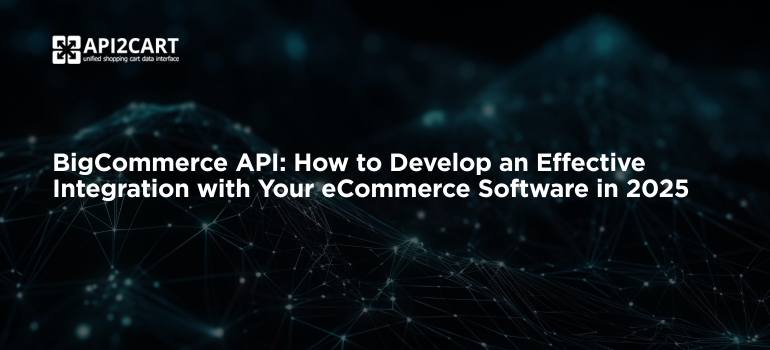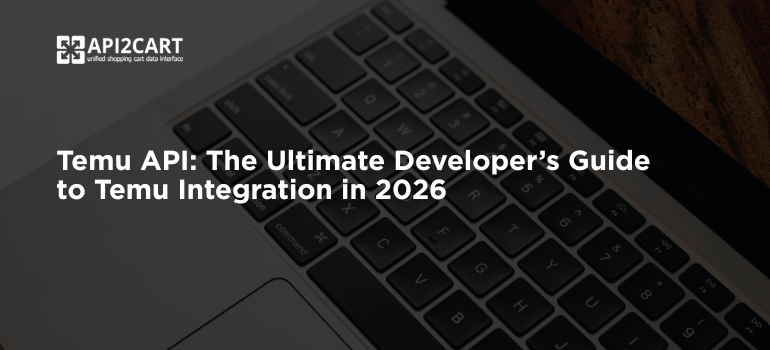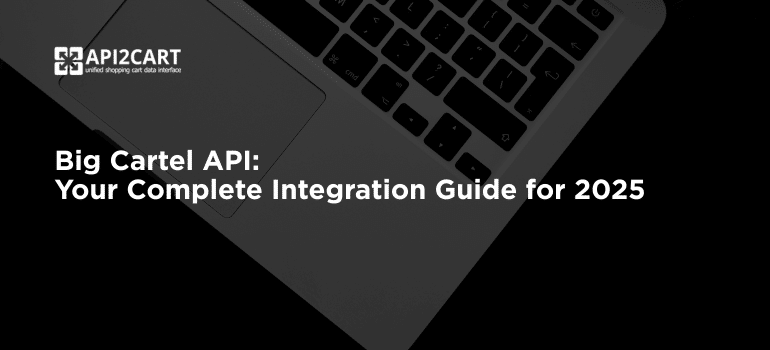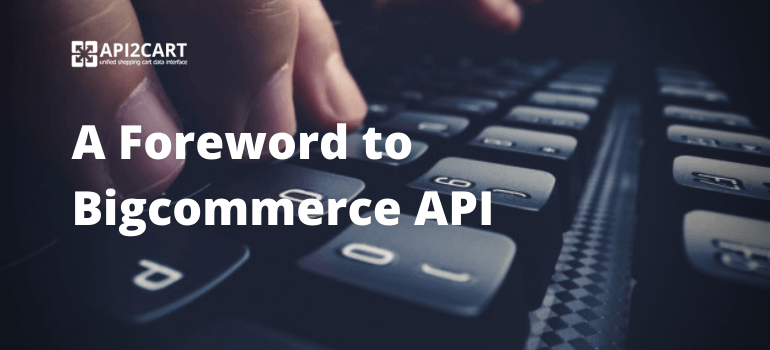
The BigCommerce API is a powerful entry point for eCommerce software teams looking to expand functionality, automate workflows, and build scalable integrations for merchants worldwide. Whether you are an experienced bigcommerce api developer or just beginning to explore how the platform structures data, understanding the API is essential for creating reliable, high-performance solutions.
As the platform continues to grow — including a +1.9% QoQ increase in Q1 2025 and consistent year-over-year expansion — more vendors are searching for practical guidance and real bigcommerce api examples that demonstrate how orders, products, customers, and inventory can be exchanged between external systems and BigCommerce. This guide covers the fundamentals of the BigCommerce REST API, provides real-world examples, and shows how to simplify integration using API2Cart. It also outlines what a bigcommerce api developer should know when designing scalable, maintainable integrations for SaaS products.
What Is BigCommerce?
BigCommerce is a leading hosted eCommerce platform that offers powerful store customization, a drag-and-drop page builder, a flexible product catalog, modern checkout options, and efficient tools for payments, shipping, and marketing.

Today, BigCommerce powers more than 60,000 online stores across the world, with the largest concentrations in the United States, the United Kingdom, Australia, Canada, and Brazil.
Overview of the BigCommerce API
The BigCommerce API is built on modern REST principles and allows developers to work with data such as products, categories, customers, orders, shipments, brands, and more. For complete technical documentation, refer to the official BigCommerce API docs.
- Fully REST-based API (BigCommerce REST API)
- HTTP methods:
GET,POST,PUT,DELETE - OAuth 2.0 for secure authentication
- JSON as the primary response format
- Includes GraphQL API for optimized data queries
- Built-in validation, logging, and versioning
- Rate limits (throttling) for API protection
API responses use standard HTTP codes:
- 2xx – success
- 3xx – redirection
- 4xx – client errors
- 5xx – server errors
When rate limits are exceeded, BigCommerce may return 509 Bandwidth Limit Exceeded, so efficient request handling is essential in integration architecture.
Why BigCommerce API Integration Matters
High-quality BigCommerce API integration allows eCommerce software solutions to expand functionality, automate workflows, synchronize data efficiently, and deliver a better end-user experience.
- Automatic synchronization of products, stock, categories, orders, and customers
- Real-time data exchange
- Ability to publish apps in the BigCommerce App Marketplace
- Improved competitiveness against non-integrated systems
- Continuous compatibility with new BigCommerce features
A reliable BigCommerce REST API integration is essential for accessing orders, deliveries, pricing, taxes, and customer data.
Integration Challenges for Developers
Building a BigCommerce integration from scratch can be complex and costly for any BigCommerce API developer.
- Initial learning may take up to a month
- Complex endpoints and nested data structures
- Developer costs from $3,000 to over $10,000 monthly including maintenance
- Ongoing need to monitor API updates, new versions, and bugs
- Continuous support and troubleshooting required
BigCommerce Customer API
The BigCommerce Customer API enables detailed customer management and segmentation. Key capabilities include:
- Create, update, and retrieve customers
- Manage customer groups and segments
- Analyze purchase history and behavior
- Retrieve wishlist data for personalization
This API is essential for CRM systems, loyalty apps, marketing automation tools, and analytics platforms.
BigCommerce API Examples
Below is a real-life BigCommerce API example of an order structure (compatible with API2Cart’s BigCommerce connector).
Example Response: OrderAdd. method:
{
"order_id": "25",
"store_id": "1",
"channel_id": "1",
"order_status": "Completed",
"customer_email": "[email protected]",
"order_payment_method": "PayPal",
"transaction_id": "d41d8cd98f00b204e9800998ecf8427e",
"currency": "USD",
"date": "2012-09-25 19:40:00",
"bill_first_name": "Adam",
"bill_last_name": "Smith",
"bill_address_1": "Green str. 35",
"bill_city": "Chicago",
"bill_state": "IL",
"bill_country": "US",
"shipp_first_name": "John",
"shipp_last_name": "Smith",
"shipp_city": "Chicago",
"subtotal_price": 563.23,
"total_price": 23.56,
"discount": 5.5,
"order_item": [
{
"order_item_id": "125",
"order_item_name": "Product 1",
"order_item_model": "sku_1",
"order_item_price": "1.32",
"order_item_quantity": "5",
"order_item_variant_id": "52",
"order_item_option": [
{
"order_item_option_name": "Color",
"order_item_option_value": "green",
"order_item_option_price": 2.3
}
]
}
]
}
Full method reference: API2Cart OrderAdd documentation .
Simplifying BigCommerce API Integration with API2Cart
API2Cart is a unified API that allows developers to integrate with BigCommerce and 60+ other eCommerce platforms using a single interface. It reduces development cost, minimizes maintenance, and enables fast scaling across multiple platforms.
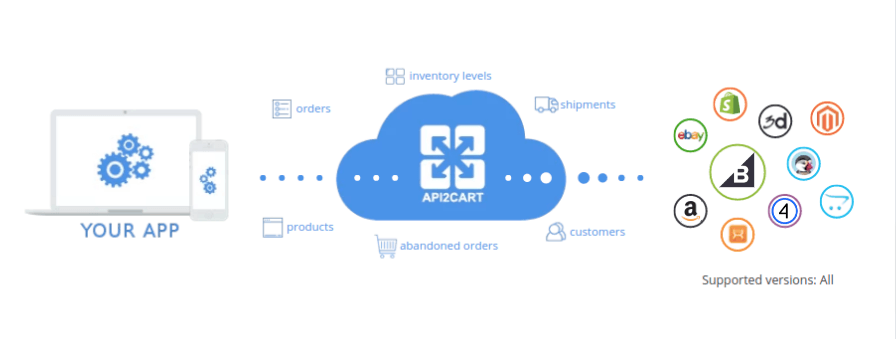
- Access multiple BigCommerce stores at once
- Retrieve and sync products, customers, orders, categories, and more
- Use webhooks for real-time updates
- Avoid maintaining multiple separate integrations
Unique BigCommerce API Use Cases via API2Cart
Gift Cards (cart.giftcard.add/list/delete)
API2Cart supports advanced methods such as cart.giftcard.add.method for creating, listing, and deleting gift cards. This functionality is ideal for loyalty tools and promotional engines.
Wishlists (customer.wishlist.list)
The customer.wishlist.list.method retrieves all wishlist items for personalized recommendations and remarketing.
Customer Groups (customer.group.add/list)
The
customer.group.add.method
allows creating customer groups, while customer.group.list.method retrieves existing ones.
Order Transactions (order.transaction.list)
The order.transaction.list.method retrieves all payment transactions for accounting, reconciliation, and invoicing systems.
Conclusion
The BigCommerce API provides a robust and scalable framework for building advanced eCommerce solutions. However, implementing and maintaining a BigCommerce API integration can be time-consuming, costly, and technically demanding.
API2Cart significantly simplifies this process by offering a single unified API that works with BigCommerce and 60+ other platforms. Explore the technical documentation at API2Cart Docs, or Start your 14-day free trial to evaluate integration for your use case.
